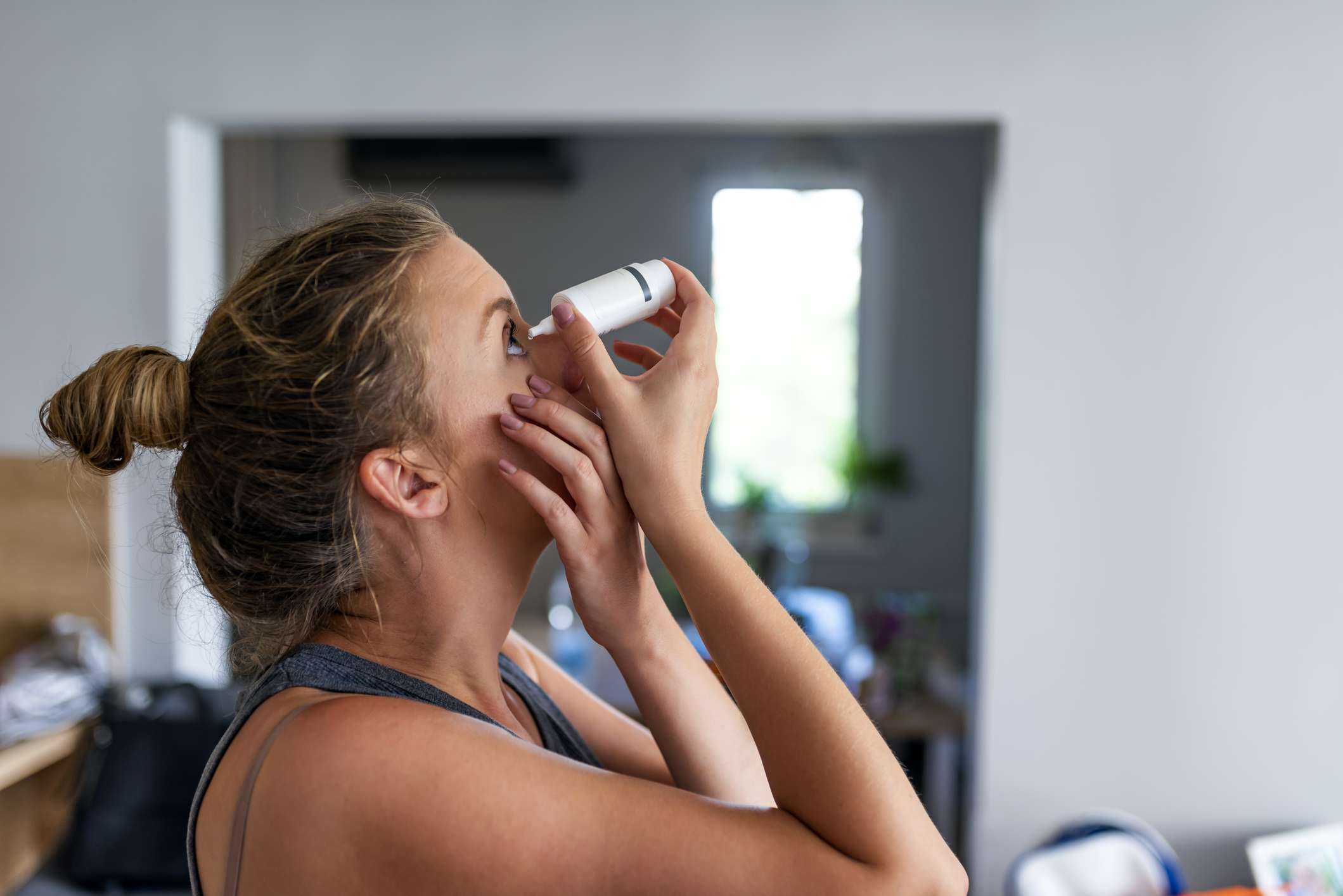Infection
Check Your Cabinets: FDA Warns These 27 Eye Drop Products Could Cause Infection
Twenty-seven eye drop products sold at popular retailers such as CVS and Target could potentially cause eye infections that may lead to vision issues, the Food and Drug Administration (FDA) warned earlier this week.
The agency asked that people stop using and discard any of the 27 affected eye drop products.
FDA investigators said that the products—which are supposed to be sterile—were manufactured in an “insanitary” facility. They found that multiple production areas in the facility tested positive for bacteria during environmental sampling tests.
ljubaphoto/Getty Images
The 27 eye drop products are sold under the following brands:
- CVS Health
- Target Up & Up
- Walmart
- Rite Aid
- Leader (Cardinal Health)
- Rugby (Cardinal Health)
- Velocity Pharma
On Wednesday, Cardinal Health issued a voluntary recall of six of its eye drop products under the brand name Leader. Five were included in the FDA’s original warning announcement.
Cardinal Health said that they’ve received three reports of adverse events related to the recalled eye drops.
Cardinal Health recalled eye drops can be identified with the following information:
- Eye Irritation Relief, 15 mL, product code 70000-0087-1
- Dry Eye Relief, 15 mL, product code 70000-0089-1
- Dry Eye Relief, 10 mL, product code 70000-0088-1
- Lubricant Eye Drops, 15 mL, product code 70000-0090-1
- Lubricant Eye Drops, 15 mL twin pack, product codes 70000-0090-2 or 70000-0090-1
- Lubricant Eye Drops, 10 mL, product code 70000-0587-1
These were distributed nationwide starting on December 12, 2021, the company said.
At this time, the other brands named in the FDA warning have not provided information about specific lot numbers or product codes, or when the products were distributed. However, the FDA did provide a full list of each product name and its ingredient information for people to reference.
The affected eye drops sold at Walmart, CVS, Rite Aid, and Target are being removed from store shelves and each company’s website. However, the Leader, Rugby, and Velocity eye drop products may still be available, though people shouldn’t purchase them.
Leader (Cardinal Health) said they’re “arranging for the return” of the recalled products and asked that any distributors or retailers stop selling their recalled eye drops.
Beyond the three adverse reactions linked to the Leader (Cardinal Health) brand eye drops, the FDA is not reporting any other related eye infections. But healthcare providers and users of the products are being asked to document any adverse reactions via the FDA’s MedWatch page.
“Our manufacturing facilities should be sterile. And these drops should come off of [manufacturing] lines that are sterile,” Loretta Szczotka-Flynn, OD, PhD, Searle-Huang professor of ophthalmology and visual sciences and director of the vision research coordinating center at the Case Western Reserve University School of Medicine, told Health.
“They’re stopping a problem before it occurs,” she added.
The agency originally recommended that the manufacturer recall the eye drops on October 25, and it issued its first safety warning on Friday. That statement included 26 eye drop products, and the Walmart brand eye drops were added to the list on Monday.
This FDA announcement is the second to sound the alarm on eye drop safety in the last few months—in late August, the agency warned customers to avoid Dr. Berne’s and LightEyez eye drops due to a similar issue.
And in early February, the Centers for Disease Control and Prevention (CDC) urged people to stop using EzriCare eye drops, after bacterial contamination in the product was linked to a string of hospitalizations and one death.
Due to the severity of that outbreak, the FDA seems to be stepping up its oversight, according to Szczotka-Flynn.
“We hadn’t seen anything like that in our field for a very long time,” she said.
Though it hasn’t been confirmed by the agency, the FDA seems to be doing more investigations of private label or less-established eye drop manufacturers, said Szczotka-Flynn.
It’s important for agencies to jump on potential sterility issues when it comes to eye drops in particular, since “drugs applied to the eyes bypass some of the body’s natural defenses,” the FDA said.
In the case of the EzriCare eye drops, the product was contaminated with Pseudomonas, a type of bacteria that ended up being resistant to many common antibiotics, said Szczotka-Flynn. This made it challenging for healthcare professionals to quickly treat the eye infections.
In its most recent warning, the FDA didn’t disclose which type of bacteria was found in the manufacturing facility, and it didn’t explicitly say that any bacteria was found in the eye drops themselves.
Still, the FDA’s warning is out of an abundance of caution. Contact lens wearers in particular are more prone to bacterial keratitis, or an infection of the cornea caused by bacteria. In very severe cases, this infection can cause a person to need a corneal transplant, or can even cause blindness.
Usually, Szczotka-Flynn said, these infections are treatable with antibiotics.
Again, with these 27 eye drop products named in the FDA warning, people should throw out any of the products they have at home, and should avoid any Leader, Rugby, and Velocity eye drop products that may still be on shelves or online.
In general, however, people don’t need to be wary about using eye drops, Szczotka-Flynn emphasized. These more frequent FDA warnings means that the agency’s oversight investigations are working as they should to prevent any potential health issues.
Larger manufacturers and name-brand eye drop products in particular, Szczotka-Flynn said, have quality control and sterilization practices that are essentially “immaculate.” The risk of any bacterial contamination with these household eye drop brands is low.
“I don’t want people to be worried about artificial tears,” she said. “We prescribe them all the time, and there’s safe, very good artificial tears on the market today.”

